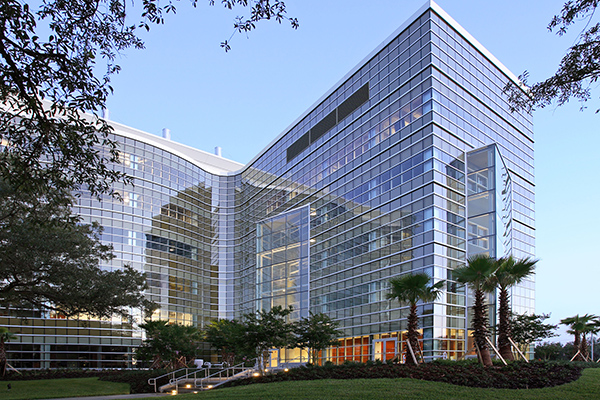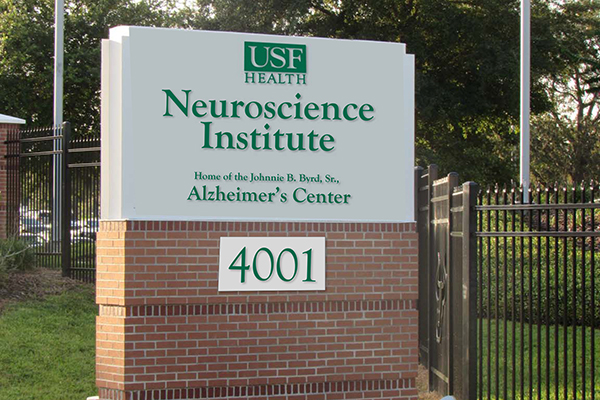The latest neuroscientist recruits will help USF Health accelerate new discoveries in Alzheimer’s disease and other neurological disorders

The USF Health Neuroscience Institute, home of the Johnnie B. Byrd Sr., Alzheimer’s Center, brings together scientists and physicians to investigate the complexities of the brain and its impact on human health and behavior.
Internationally recognized Alzheimer’s disease researcher Gopal Thinakaran, PhD, has been recruited by USF Health to help accelerate the interdisciplinary work of its Neuroscience Institute (NSI), home of the Johnnie B. Byrd Sr., Alzheimer’s Center. Dr. Thinakaran, a professor of neurobiology at the University of Chicago, will join USF Health on Aug. 1.
University of Chicago neurophysiologist Angèle Parent, PhD, will also arrive here Aug. 1 as an associate professor of molecular medicine and member of the Byrd Alzheimer’s Center.
“Dr. Thinakaran and Dr. Parent are outstanding additions to our growing USF Health Neuroscience Institute,” said Charles J. Lockwood, MD, senior vice president of USF Health and dean of the Morsani College of Medicine. “Building upon the success of the Byrd Alzheimer’s Center, Dr. Thinakaran will help us advance interdisciplinary research among USF Health scientists and physicians looking at the brain in unique ways to accelerate discoveries to cure a broad range of neurological disorders, including Alzheimer’s and related dementias, Parkinson’s, ataxias, epilepsy, multiple sclerosis, ALS and stroke. Moreover, Dr. Parent brings to the USF Health NSI a critical line of research into the mechanisms of memory dysfunction in dementia”
Over the last decade Dr. Thinakaran built one of the country’s leading laboratories investigating the molecular and cellular processes underlying Alzheimer’s disease, the major form of dementia afflicting an estimated 5.8 million Americans. He uses cutting-edge cell biology techniques and mouse models to probe nerve cell pathways responsible for Alzheimer’s disease pathology and neuronal dysfunction, with the goal of finding treatments to significantly reduce or delay cognitive decline. Recently, he began exploring the molecular link between type 2 diabetes and Alzheimer’s disease progression.
Supported by $5.5 million in National Institutes of Health (NIH) grant funding, Dr. Thinakaran’s work has implications for other age-related and chronic neurodegenerative diseases that, while diverse, share some common characteristics such as abnormal protein aggregates and excessive nerve cell death.
At USF Health, Dr. Thinakaran will assume leadership roles as associate dean for neuroscience research and NSI associate director of research, in addition to his appointments as a professor of molecular medicine and the Bagnor Endowed Chair in Alzheimer’s Research. He will work closely with NSI CEO Harry van Loveren, MD; Stephen Liggett, MD, vice dean of research for the USF Health Morsani College of Medicine; and David Kang, PhD, director of basic research at the Byrd Alzheimer’s Center, to expand and integrate basic, translational and clinical neurosciences research across USF.
Dr. Parent studies how the brain remembers and what goes wrong with memory storage mechanisms in neurodegenerative diseases, focusing on communication between nerve cells (synaptic transmission) and neuronal plasticity. This April, Dr. Parent’s team published a study in Cell Reports demonstrating that sustained amyloid precursor protein (APP) signaling favors adaptive changes in the brain and prevents memory decline in an Alzheimer’s disease mouse model. She recently received a five-year, $1.75-million NIH grant to examine how differences in APP metabolism affect memory in sleep-disturbed Alzheimer’s mice.
An accomplished scientist who does not hesitate to explore uncharted territory, Dr. Thinakaran is also “a wonderful communicator, spokesman, and builder,” Dr. Liggett said. “As USF Health intensifies its effort to conquer Alzheimer’s disease and other dementias, as well as related neuroscience research, he will play an integral role in moving us forward. His combination of excellence in these skills is not that common, and I look forward to working with him to reach new heights in these research areas.”
NSI’s Dr. Van Loveren, chair of neurosurgery at MCOM, said Dr. Thinakaran recognizes the power of bringing different disciplines together to tackle the complexities of the brain and its impact on human health and behavior. “He is a scientific leader who understands the challenges of translating laboratory findings into new therapies that can target the root causes of neurodegenerative diseases – and the value of coordinated teamwork needed to bridge that gap.”
Both Dr. Thinakaran and Dr. Parent were recruited with the help of funding allocated through USF’s designation as a Preeminent State Research University. The University of Chicago neuroscientists are the newest NIH-funded faculty members recruited since fall 2018 to strengthen and complement existing talent at the NSI’s Byrd Alzheimer’s Center. Others include:
- Krishna Bhat, MD, PhD, professor of molecular medicine and the Mary & Harry Goldsmith Endowed Chair in Alzheimer’s Disease, studies the genes and proteins that regulate the division of neuronal stem cells.
- Lianchun Wang, MD, professor of molecular pharmacology and physiology and USF Endowed Chair of Neurovascular Research, investigates the structure and function of a common linear polysaccharide, heparan sulfate, in inflammation, blood vessel development, stem cell biology, cancer and Alzheimer’s disease.
- Alexa Woo, PhD, assistant professor of molecular pharmacology and physiology, studies how multifunctional B-arrestin proteins contribute to tau pathology, a hallmark of Alzheimer’s and other neurodegenerative diseases in the brain.
Dr. Thinakaran said he was impressed by USF Health’s support of its well-established Byrd Alzheimer’s Center and the university’s drive to create an institute internationally known for its collaborative neurosciences research and training.
“I look forward to the opportunities to expand USF Health’s expertise in other neurological diseases and generate energy that will feed existing Alzheimer’s research,” he said.



